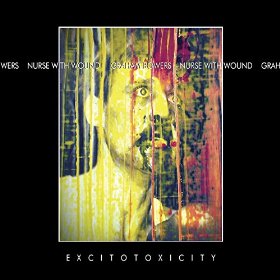 Excitotoxicity is an unwanted process where neurons become over-activated from a surplus of the neurotransmitter glutamate, resulting in cell death and, ultimately, tissue damage and degeneration. Essentially, neurons receive too much stimulation causing the usually well-balanced internal physiology of each cell to become off-kilter and produce excessive levels of harmful molecules that break the neuron down from the inside-out. It is believed to be an underlying part of a number of serious neurological diseases including motor neuron disease, a disease that Graham Bowers has become a victim of. This album is partly a musical diary, an artistic interpretation of neurophysiological processes and a very human response to an unfathomable loss of control.
Excitotoxicity is an unwanted process where neurons become over-activated from a surplus of the neurotransmitter glutamate, resulting in cell death and, ultimately, tissue damage and degeneration. Essentially, neurons receive too much stimulation causing the usually well-balanced internal physiology of each cell to become off-kilter and produce excessive levels of harmful molecules that break the neuron down from the inside-out. It is believed to be an underlying part of a number of serious neurological diseases including motor neuron disease, a disease that Graham Bowers has become a victim of. This album is partly a musical diary, an artistic interpretation of neurophysiological processes and a very human response to an unfathomable loss of control.
ExcitoToxicity’s release comes at a time when mentions of motor neuron disease (MND; or amyotrophic lateral sclerosis, ALS) are running like wildfire through social media thanks to the ice bucket challenge. In contrast to the scores of healthy, young people light-heartedly "raising awareness" about a disease that many cannot describe let alone imagine, this release from Bowers and Steven Stapleton is a quiet and lonely call from the other side of the coin. It is impossible to listen to ExcitoToxicity without taking account of all the contextual information that the album carries with it from the dispassionate facts of how excitotoxicity and disease occur in the body to the highly personal journey that Bowers has found himself traveling upon. "Chains and Gates" begins from an ominous silence before building into a beat and guitar heavy crescendo. The rhythms are sabotaged and pushed into the background by sparks of sound and bell-like interruptions, much like the regular firing of the nervous system becomes dysregulated and disrupted by abnormal activity within itself during neurodegeneration. The album continues in this manner, setting up musical scenarios and dashing them upon the rocks of atonality.
Much like the duo’s first collaboration, Rupture, which dealt with the damage done to the brain through stroke, the idea of the brain as a tightly controlled musical engine (due to its inherent rhythmic activity in the form of brain waves) is used here to demonstrate how delicate this system can be. Throughout ExcitoToxicity, noises begin at low volumes and repeat while simultaneously rising to uncomfortable and almost painful levels. This is a fantastic audiological metaphor for the physiological process of excitotoxicity as neurons fire and fire and fire until they physically break down. More specific references to MND/ALS are made through the titles, "Jack Hammer Mutation"referring to genetic factors associated with the disorder and "Broken Symmetry" reflects the progression of the disease, with paralysis usually developing along one side of the body before crossing over to the other.
Taking all this together as a concept album, it is very clever. Add in the fact that the music is a step up from previous NWW/Bower collaborations (which have been brilliant so far) and this makes for a wonderful release. However, just when I become embroiled enough in the album to get lost in its sounds, I remind myself of Bowers himself going through the emotional and physical turmoil of his body closing in on itself as MND/ALS is a neurological disorder that spares the mind; unlike Alzheimer’s or even extreme Parkinson’s, MND/ALS will destroy the motor system but leave the patient fully aware. Therefore, to think of ExcitoToxicity as purely an art project about a disorder does it a huge disservice, it is also the sound of a man coming to terms with his own mortality and how the rest of his days will be spent. Knowing this makes every second of ExcitoToxicity precious and heavy, heavier than any other recorded work I can think of.
samples:
 
Read More

